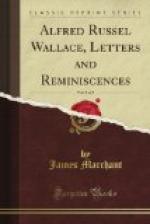P.S.—I should say that the efficacy of lip-expression, undeniably, is most subtle, and defies definite description.
* * * * *
TO DR. ARCHDALL REID
Parkstone, Dorset. April 19, 1896.
Dear Sir,—I am sorry I had not space to refer more fully to your interesting work.[27] The most important point on which I think your views require emendation is on instinct. I see you quote Spalding’s experiments, but these have been quite superseded and shown to be seriously incorrect by Prof. Lloyd Morgan. A paper by him in the Fortnightly Review of August, 1893, gives an account of his experiments, and he read a paper on the same subject at the British Association last year. He is now preparing a volume on the subject which will contain the most valuable series of observations yet made on this question. Another point of some importance where I cannot agree with you is your treating dipsomania as a disease, only to be eliminated by drunkenness and its effects. It appears to me to be only a vicious habit or indulgence which would cease to exist in a state of society in which the habit were almost universally reprobated, and the means for its indulgence almost absent. But this is a matter of comparatively small importance.—Believe me yours very truly,
ALFRED R. WALLACE.
* * * * *
TO DR. ARCHDALL REID
Parkstone. April 28, 1896.
Dear Sir,—“We can but reason from the facts we know.” We know a good deal of the senses of the higher animals, very little of those of insects. If we find—as I think we do—that all cases of supposed “instinctive knowledge” in the former turn out to be merely intuitive reactions to various kinds of stimulus, combined with very rapidly acquired experience, we shall be justified in thinking that the actions of the latter will some day be similarly explained. When Lloyd Morgan’s book is published we shall have much information on this question. (See “Natural Selection and Tropical Nature,” pp. 91-7.)—Yours truly, ALFRED R. WALLACE.
* * * * *
TO PROF. MELDOLA
Parkstone, Dorset. October 12, 1896.
My dear Meldola,—I got Weismann’s “Germinal Selection” two or three months back and read it very carefully, and on the whole I admire it very much, and think it does complete the work of ordinary variation and selection. Of course it is a pure hypothesis, and can never perhaps be directly proved, but it seems to me a reasonable one, and it enables us to understand two groups of facts which I have never been able to work out satisfactorily by the old method. These two facts are: (1) the total, or almost total, disappearance of many useless organs, and (2) the continuous development of secondary sexual characters beyond any conceivable utility, and, apparently, till checked by inutility. It explains both these. Disuse alone, as I and many others have always argued, cannot do the first, but can only cause regression to the mean, with perhaps some further regression from economy of material.




